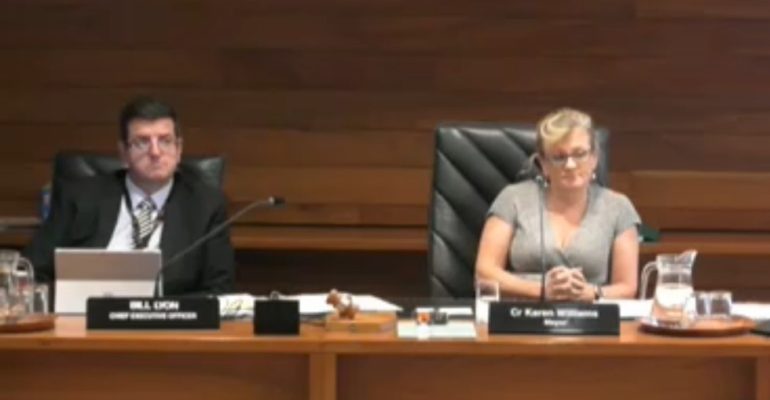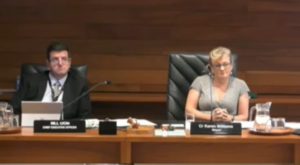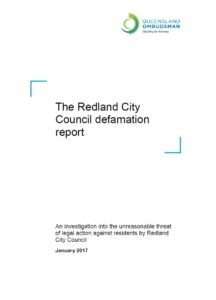

CEO Bill Lyon and Mayor Karen Williams at a council meeting in October 2016
An investigation into Redland City Council’s unreasonable threat of defamation action against two city residents is yet to be resolved.
The Ombudsman published The Redland City Council Defamation Report over two months ago, on 5 January 2017.
Redland City Council’s Mayor, CEO and General Counsel were each given an opportunity to respond to the Ombudsman’s adverse findings well in advance of the final report being published. None did so.
The Ombudsman’s report includes recommendations for corrective action which have not yet been complied with.
City councillors should be raising questions about the way in which this whole matter has been handled and require that it be dealt with and properly resolved at a council general meeting.
The Ombudsman’s findings
Questions about the integrity of decision-making by Redland City Council’s Mayor Karen Williams, CEO Bill Lyon and General Counsel Andrew Ross were raised by the Ombudsman in his report.
In his report the Ombudsman said:
The investigation found that council’s actions in threatening defamation proceedings against both complainants was unreasonable. The investigation further found that council’s actions in threatening to take defamation action against the complainants was:
- based on a lack of clear analysis regarding who, if anybody, was defamed by the comments
- not based on instructions from any of the allegedly defamed parties
- not a reasonable or proportional response to what was relatively minor criticism of council’s decisions
The Ombudsman’s report contained four recommendations:
- Council ensures that key officers receive further training about defamation law including what may, and may not, constitute defamation under Queensland law.
- Council prepare a policy to guide decision-making around whether to fund private legal action on behalf of employees or councillors and disclose any such expenditure in publicly available financial reports.
- Council write to Complainant B and acknowledge that its action in writing to Complainant B’s employer was based on a mistaken understanding that Complainant B had published defamatory material on social media using her professional email account.
- Council write to Complainant A and Complainant B and withdraw its threat to take legal action in response to the comments published on social media.
Council reaction to the Defamation Report
The Ombudsman notes in his report that to ensure procedural fairness:
I identified that comments and discussion in this report could be considered as being adverse towards the Mayor, the CEO and General Counsel. Accordingly, pursuant to s.55(2) of the Ombudsman Act, I provided a copy of this report to each of these officers for their comment in September 2016.
The Ombudsman received an unsigned response from Redland City Council on 4 November 2016.
The Ombudsman notes in his final report that the Council’s submission “does not address any of the adverse comment and discussion in the proposed report about the Mayor, CEO or General Counsel”.
He goes on to say:
I have therefore assumed that there are no specific objections to any of the comments made about the Mayor, CEO or General Counsel in the report.
On 6 January 2017, the day after the Ombudsman’s report was published, Redland City Council published a statement which included the following:
…Council believes the publication of the final report without consultation was procedurally unfair.
It’s understood that on 6 February 2017 the Council responded to the Ombudsman’s final report. The Council’s response has not been made publicly available.
The Ombudsman’s office recently advised Redlands2030 that matters raised in the Ombudsman’s Redland City Council Defamation Report report are yet to be resolved.
What are the divisional councillors doing about this?
It appears that the Council’s responses to the Ombudsman’s report may have been determined by one or more of the people about whom adverse findings were made.
In an organisation with high standards of corporate governance, protocols would be in place to manage any perceptions of conflict of interest.
Such protocols would ensure separation between the individual interests of the people whose conduct was reviewed by the Ombudsman, and the overall interests of the Redland City Council.
In this case, the appropriate entity to oversee the implementation of such protocols is the full Redland City Council.
There have been four general meetings of Redland City Council since the Ombudsman’s report was published but it has not been discussed at any of these meetings.
The community is left to assume that Redland City’s councillors collectively condone the actions and decision making processes which resulted in an adverse investigative report being published by the Ombudsman.
Possible further action by the Ombudsman
If an agency does not implement recommendations by the Ombudsman, he can elevate the matter by giving a copy of his report to the Premier.
The Ombudsman may also make a report to the Queensland Parliament.
Further Reading
- Redland City Council defamation report, Ombudsman, 5 January 2017
- Ombudsman blasts Redland City Council over Facebook legal threats, Brisbane Times, 5 January 2017
- Statement in response to Ombudsman Report, Redland City Council, 6 January 2017
- Ombudsman slams Redland City Council, Redlands2030, 23 January 2017
- Ombudsman Act 2001
Redlands2030 – 10 March 2017
Please note: Offensive or off-topic comments will be deleted. If offended by any published comment please email thereporter@redlands2030.net

2 Comments
Can’t even access Council’s right to information disclosure logs online, they are just documents linking to non-existant documents.
https://www.redland.qld.gov.au/info/20195/right_to_information_and_information_privacy/436/disclosure_log
Says it all really about the competencies of Redland City Council to abide by its legislative obligations. What a bunch of frauds.
As has been said in Biblical folklore, the day of reckoning is nigh.
And in this case it is long overdue.